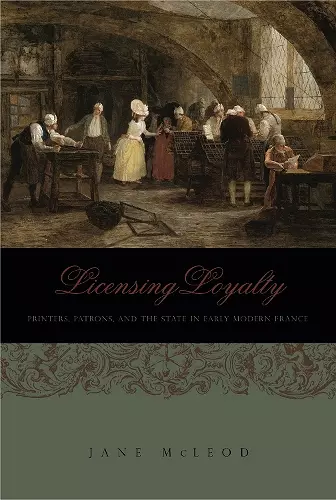Licensing Loyalty
Printers, Patrons, and the State in Early Modern France
Format:Paperback
Publisher:Pennsylvania State University Press
Published:15th Apr '11
Currently unavailable, and unfortunately no date known when it will be back
This paperback is available in another edition too:
- Hardback£74.99(9780271037684)

In Licensing Loyalty, historian Jane McLeod explores the evolution of the idea that the royal government of eighteenth-century France had much to fear from the rise of print culture. She argues that early modern French printers helped foster this view as they struggled to negotiate a place in the expanding bureaucratic apparatus of the French state. Printers in the provinces and in Paris relentlessly lobbied the government, hoping to convince authorities that printing done by their commercial rivals posed a serious threat to both monarchy and morality. By examining the French state’s policy of licensing printers and the mutually influential relationships between officials and printers, McLeod sheds light on our understanding of the limits of French absolutism and the uses of print culture in the political life of provincial France.
“Beautifully written, elegantly argued, and extensively documented from archives all over France, Jane McLeod's investigation of how provincial printers were licensed and supervised between the reign of Louis XIV and the French Revolution adds a whole new dimension to our understanding of how the old regime worked. She shows how inadequate it has been to form a view of the world of print from evidence only about Paris and from illicit works produced beyond the kingdom's borders. Her book will now be essential to a fuller understanding of the prerevolutionary public sphere.”
—William Doyle, University of Bristol
“Jane McLeod’s detailed research helps us see how interest groups like provincial printers helped construct the Old Regime’s regulatory mechanisms. Deeply enmeshed in local and national networks of patronage, these men—often members of family dynasties—had little reason to favor either free economic competition or subversive new ideas. Challenging widespread assumptions about the role of print media in subverting the monarchy, McLeod shows that the Revolution of 1789 would be a challenge as much for printers as for the officials charged with supervising them.”
—Jeremy D. Popkin, University of Kentucky
“This incisive treatment of provincial printing houses’ relations with the royal government explains how the French monarchy successfully worked with provincial printers to determine publishing policy and control print media throughout France. Jane McLeod challenges conventional views of the ties between the royal state and printers, showing how the state’s policy of issuing a limited number of licenses, traditionally considered a repressive measure, came to find widespread support among the established printer elite. Along with highly useful local monopolies and lucrative government printing contracts, licenses conferred on these fortunate men and women a new, unexpected identity: in addition to their older roles as professionals, guildsmen, and clients of local bishops and judicial officials, they increasingly became lobbyists and supporters of royal ministers, endorsing their policies of state controls on the printing trade and on the flow of ideas. McLeod demonstrates how it was only chance and circumstance that occasionally transformed them into champions of free thought, an identity which in retrospect we too easily and often confer on them, and how thoroughly the provincial printers gradually turned into creatures of the king and his ministers, sharing the ambiguous and contradictory loyalties, interests, and identities so characteristic of eighteenth-century elites.”
—T. J. A. Le Goff, York University
“Through carefully constructed case studies drawn from printing centers large and small, McLeod reveals the stakes that locals believed they had in the [licensing] process and how its implementation undercut local authorities. . . .Her close examination of individual printers and family fortunes reveals shrewdness and ruthlessness, discipline and patience—qualities essential to advancing social ambitions over generations. McLeod has exhaustively mined Parisian and provincial archives to compose this meticulous account.”
—April G. Shelford American Historical Review
“Licensing Loyalty will be of great value for those interested in publishing, in guilds and in the growing bureaucratic state. McLeod offers a fresh analysis of printing as a profession by focusing on printers’ routine activities over a century, rather than their exceptional moments of controversy, and she adds substantively to our understanding of both the emerging bureaucratic state and one of the central venues of Enlightenment culture.”
—David Kammerling Smith Social History (U.K.)
“[Licensing Loyalty] provides a detailed picture of the interests, discourses, actions, and relationships of printers throughout France under the Old Regime. This picture furthers our understanding not just of the book trade but of the state-building process in the century and a half between the end of the Wars of Religion and the beginning of the French Revolution. It is thus relevant to scholars of print culture, absolutism, and Enlightenment in early modern Europe.”
—Christine Haynes Journal of Modern History
ISBN: 9780271037868
Dimensions: 229mm x 152mm x 22mm
Weight: 476g
312 pages